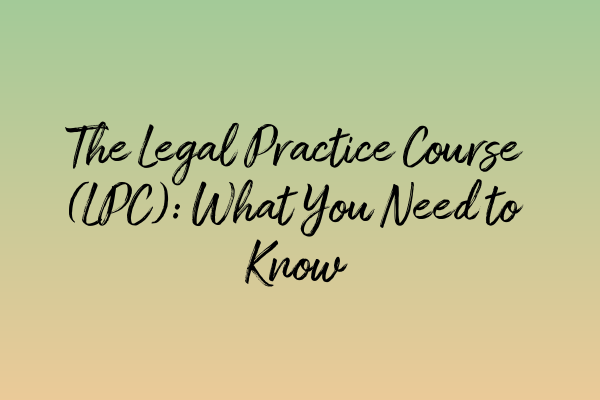The Legal Practice Course (LPC): What You Need to Know
Are you considering a career as a solicitor? If so, then you’ve probably already come across the term “Legal Practice Course” or LPC. But what exactly is the LPC and why is it so important in the journey to becoming a solicitor? In this blog post, we’ll answer all your burning questions about the LPC and provide you with a comprehensive guide to help you navigate through this crucial stage of your legal career.
What is the Legal Practice Course (LPC)?
The LPC is a postgraduate course that aspiring solicitors in England and Wales must undertake after completing their law degree and before they can qualify as a solicitor. It is a practical and vocational course that bridges the gap between academic legal study and the actual practice of law.
The Purpose and Structure of the LPC
The purpose of the LPC is to equip future solicitors with the necessary practical skills and knowledge to excel in the legal profession. The course focuses on honing your drafting, legal research, negotiation, and advocacy skills, among others.
Typically, the LPC is divided into two stages: the core modules and the elective modules. During the core modules, which are compulsory, you’ll cover essential subjects such as business law and practice, litigation, property law and practice, and professional conduct and regulation. These core modules provide a solid foundation in the key areas of legal practice.
Once you’ve completed the core modules, you’ll move on to the elective modules. This is where you can tailor your LPC experience to your specific areas of interest or practice. The elective modules cover a wide range of legal practice areas including commercial law, family law, employment law, and intellectual property law, just to name a few.
Assessment and Qualification
Assessment on the LPC is varied and includes both written assignments and practical assessments. You’ll be required to complete both individual and group tasks to demonstrate your understanding and competence in applying legal principles.
Upon successful completion of the LPC, you’ll be awarded a Postgraduate Diploma in Legal Practice. However, it’s important to note that the LPC alone does not qualify you as a solicitor. To become a fully qualified solicitor, you’ll need to secure a training contract with a law firm and complete a two-year period of recognized training.
Choosing the Right LPC Provider
When it comes to choosing an LPC provider, it’s vital to do your research and select a reputable institution. The quality of the LPC course you undertake can significantly impact your future career prospects. Look for institutions that have a strong reputation for delivering high-quality legal education and have established connections with law firms for training contract opportunities.
Additionally, consider factors such as location, cost, and the flexibility of delivery options. Some institutions offer full-time, part-time, and online LPC programs to accommodate different needs and preferences.
Preparing for the LPC
The LPC is an intensive course, and it’s important to be well-prepared before embarking on this journey. During your law degree, focus on developing your legal research, writing, and critical thinking skills as these will be invaluable on the LPC.
It’s also beneficial to gain practical legal experience through vacation schemes, internships, or pro bono work. This not only enhances your understanding of the law in practice but also demonstrates your commitment and dedication to prospective employers.
Lastly, remember to keep up with legal news and developments to stay informed about the profession and its future trends. This knowledge will not only enrich your studies but will also give you an edge in interviews and discussions.
Final Thoughts
The Legal Practice Course is a crucial milestone on the path to becoming a solicitor. It provides the practical skills and knowledge necessary to succeed in the legal profession. By selecting the right LPC provider, preparing effectively, and staying motivated, you’ll be well-equipped to tackle the challenges of the LPC and take the next step towards your dream career as a solicitor.
Are you ready to embark on this exciting journey? Contact our team at Becoming-solicitor-sra.co.uk to learn more about the Legal Practice Course and how we can support you in your pursuit of becoming a solicitor.


Leave a Reply